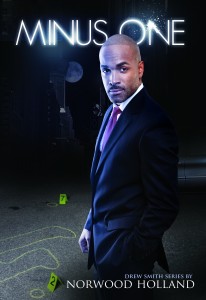Perfect Peace by Daniel Black
November 6, 2011
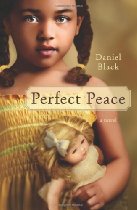
Reading Perfect Peace by Daniel Black words like intense, satisfying, funny, shocking, heart-rending and tragic help describe the gamut of emotions bubbling up from its pages. Never before have I read such a brotherly drama that tugs at the human heart. The author’s style is reminiscent of Tony Morrison’s early works with its folk lore quality and distinguishing contemporary realism. Anyone raised in a rural southern environment during the mid 20th century would have no problem relating to the setting of this Arkansas black community.
The story opens during the Spring of 1940 with the birth of Gus and Emma Jean Peace’s seventh son. Emma Jean’s long awaited desire and hope for a daughter are dashed but only momentarily. She resorts to blackmailing the mid-wife into silence then presents the child name Perfect to her husband and six sons as a girl and manages to carry out the masquerade for more than a half dozen years. We all know that Walter Scott’s quote “Oh what a tangle web we weave when we practice to deceive.” A calamity unfolds more intense than any Tennessee Williams psychological drama.
Probing themes like nurture vs. nature, the ignorance and superstitions associated with homophobia, and the generational consequences of parental cruelty. We follow Perfect’s growth and transformation from the perfect little girl to the confident man Paul along with the growth and development of his six brothers. It’s a journey of gratitude and forgiveness watching each child achieving success and a proper place in the world despite the parental missteps.
Daniel Black has done a superb job in the presenting these three dimensional characters as human and lovable despite their human flaws something required of every family. Thoroughly entertaining Perfect Peace is a great read I recommend it highly. 5 Stars
Book Review: How Could My Husband Be Gay by Ondrea L. Davis and J’son M. Lee
October 20, 2011
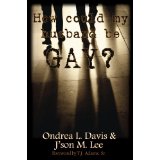 How Could My Husband Be Gay? is an autobiographical account of Ondrea L. Davis’ brief failed tumultuous marriage as penned by J’son M. Lee. There are three sides to every story, in this instant his, hers and the truth. Since this story presents only her side, the reader is forced to glean the truth from the facts given while questioning the authors’ motives for telling this deeply personal and painful story. This book is not intended to be a predictor of recognizable signs for determining or verifying suspicions of a gay husband. It is rather a moral tale of the consequences of deceit and deception.
How Could My Husband Be Gay? is an autobiographical account of Ondrea L. Davis’ brief failed tumultuous marriage as penned by J’son M. Lee. There are three sides to every story, in this instant his, hers and the truth. Since this story presents only her side, the reader is forced to glean the truth from the facts given while questioning the authors’ motives for telling this deeply personal and painful story. This book is not intended to be a predictor of recognizable signs for determining or verifying suspicions of a gay husband. It is rather a moral tale of the consequences of deceit and deception.
In the beginning the wedding offers hopes of a bright and beautiful future despite troubling signs. The groom and his mother both attempt to upstage the bride on her day. The author paints a picture of a self centered husband controlled by his mother and leading a double life. Supposedly a devout Christian his duties as husband and father become secondary to his own desires. The reader is taken on a journey including a blissful honeymoon; establishing a household, child birth and growing financial woes. Except for the husband’s homosexual tendencies this story would appear common to many marriages where one becomes disinterested and consequently withdrawn from the family. The difference here is this man’s interest lay with other men.
He finally confesses his homosexual life after the termination a marriage that seems to have lasted less than five years but long enough to produce three children. The husband’s flawed character becomes manifest when he’s convicted of fraud in his employment. Both in his domestic and work life he appears prone to deceit. The books clearest message can be found in the next to last paragraph:
“If we cannot be honest with ourselves and the person we choose to marry, we can never be genuinely happy. This is virtually impossible because our entire existence with that person would be built on a foundation of deceit. It is grossly unfair to our potential spouse and any children that are born of that union. It takes a real man (or woman) to think ahead and choose not to be the source of anguish, stress and regret for another person.”
Ondrea Davis’ reliance on faith and pastoral counseling only delays the marriage’s ultimate demise. Many single parents, husbands and wives alike may identify with her heartbreak and the experience of an unfaithful spouse who abandons the marriage. The authors do a good job of giving expression to that experience and for that purpose its recommended reading. But moreover I suspect it’s about settling a score absent forgiveness. Such a practice is generally frowned upon as it distracts from message and loses credibility and for whatever pleasure it brings the writer it can only do more harm to the family. 4 Stars
Disclaimer: This information and review are the opinions of the individual reviewer. Black Literature Magazine cannot be held accountable. The reviewer takes full responsibility for the information and opinions presented.
The Neighborhood by Brian C. Conley
October 20, 2011
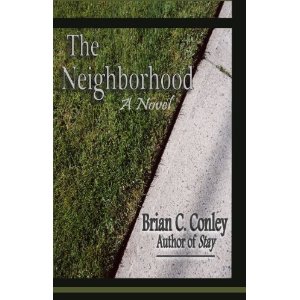 The Neighborhood Brian Conley’s second novel memorializes his old neighborhood Forest Heights Park in Baton Rouge Louisiana. It’s a fictional account–a combination of mystery and coming of age tale. The novel varies to some degree from the standard whodunit formula nevertheless it is full of colorful quirky characters and dysfunctional families. The first half is devoted to getting to know the victim 14 year old Bridget and her circle of friends particularly smitten suitors Deucy and Kyle. Bridget a lovely dark skin girl is Charles Thibadeaux’s daughter born out of wedlock to a woman not his wife but his true love. Bridget’s mother dies forcing Charles to bring her to live with his wife and two daughters of the approximate same age.
The Neighborhood Brian Conley’s second novel memorializes his old neighborhood Forest Heights Park in Baton Rouge Louisiana. It’s a fictional account–a combination of mystery and coming of age tale. The novel varies to some degree from the standard whodunit formula nevertheless it is full of colorful quirky characters and dysfunctional families. The first half is devoted to getting to know the victim 14 year old Bridget and her circle of friends particularly smitten suitors Deucy and Kyle. Bridget a lovely dark skin girl is Charles Thibadeaux’s daughter born out of wedlock to a woman not his wife but his true love. Bridget’s mother dies forcing Charles to bring her to live with his wife and two daughters of the approximate same age.
Charles Thibadeaux is a pillar of the community and by introducing his dark skin child into his perfectly blue vein bourgeois household it antagonizes his wife with dividing loyalties between their daughters. Like Cinderella dealing with an evil step mother and one evil step sister Bridget copes focused more on her desires for Kyle. With a discontent wife Charles Thibadeaux is driven to drink. Bridget’s celebrates her 14th birthday with a community pool party ending with her mysterious death. Vigilante neighbors go into action, secrets of past scandalous behavior are revealed while dredging up old resentments. The Neighborhood touches on themes of jealousy, sibling rivalries, colorism, and religious hypocrisy. Full of vivid details and richly drawn characters most of whom have issues Conley captures the experience of the provincial Southern African-American community and small town pathos.
The ability to use the different points of view is one measure of a person’s writing skill. While the general rule is for novels to adopt a single approach to point of view throughout, there are exceptions. Conley takes exception with perhaps too many points of view but when it comes to good writing he exhibits extraordinary skill as an evolving talent. The author does a great job, but I wonder how much better this tale would be with a cohesive narrative voice. There are currently too many young new writers publishing a too much pulp, but the cream rises to the top and Brian Conley on his way up. You can bet he won’t go unnoticed for long. I highly recommend The Neighborhood with great anticipation for his next. 5 Stars
Disclaimer: This information and review are the opinions of the individual reviewer. Black Literature Magazine cannot be held accountable. The reviewer takes full responsibility for the information and opinions presented.
The Warmth of Other Suns by Isabel Wilkerson
September 30, 2011
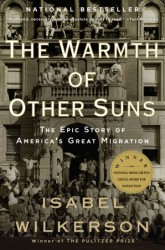
The Epic Story of America’s Great Migration is a testimony to the 20th Century African American struggle when the railroad to freedom was no longer underground but remaining for some a journey no less fraught with danger and resistance. Isabel Wilkerson painfully details the life stories of three migrants who escaped the oppression of the Jim Crow South. From 1915 to 1970 six million Blacks joined the exodus abandoning the confederate states for the promise of a better life elsewhere–most often northern industrial cities. It was a time of lynching, voter suppression, intimidation, systematic disenfranchisement, oppressive labor conditions and terrorism by lynching and bombings.
The title The Warmth of Other Suns is borrowed from Richard Wright’s quote
I was leaving the South to fling myself into the unknown. I was taking a part of the South to transplant in alien soil, to see if it could grow differently, if it could drink of new and cool rains, bend in strange winds, respond to the warmth of other suns, and, perhaps, to bloom. On a broad canvas Wilkerson paints a riveting and moving account of the racism and injustice faced by Blacks throughout the 20th Century and looking back one wonders what did Southern White America expect to gain from Jim Crowism. It ultimately hurt the South retarding its economic development.
Ida Mae Brandon Gladney, George Swanson Starling, and Robert Joseph Perching Foster, were from Mississippi, Florida, and Louisiana respectively. Ida Mae was a cotten picker, mother, sharecropper’s wife and later matriarch. Dr. Robert Joseph Perching Foster a graduate of Morehouse and Meharry escaped the boondocks and bayous to live out the high life he dreamed of but not without his own tales of woe discrimination and humiliation. George Swanson Starling a fruit picker whose labor organizing activities on behalf of blacks forced him to flee Florida with white vigilantes on his heels.
Wilkerson carries us through the life stories of the three sharing their hopes and dreams. We rejoice at their milestones and achievements, despair with their loss and challenges, and finally mourn their deaths. And what do we learn? According to one reviewer “if the Civil War was fought over black freedom, then it appeared during the decades following the war that the South won. Until World War I came along, that is. The Great War marked the beginning of one of the most important and under appreciated revolutions in American history.” We learn the stereotypes of Black Southerners invading northern cities corrupting communities was not so. They brought a strong work ethic, were at higher education level than northern Blacks and Whites, and overall maintained stable married households. If anything they were corrupted.
The Warmth of Others Suns is a scholarly study delivering a history lesson and told through the eyes and in the words of Americans discounted and devalued by white society throughout their lives. It’s a moral story we should never forget. Without such works like Wilkerson’s future generations may never know the full extent of the struggle suffered by those who came before us, and no doubt we stand on the shoulders of giants.
On Boycotting The Help
August 10, 2011
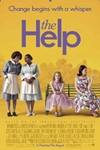 There are grumblings of a boycott of the motion picture to be released this week. A number of African American writers and readers are in awe and miffed by the success of Kathryn Stockett’s The Help; miffed because a white author tells an essentially African American story from a black perspective using a black voice. They are in awe because the book achieved an author’s dream of success with a best seller and an accompanying movie deal, but there is more, a back-story for which the author is being rewarded with a law suit.
There are grumblings of a boycott of the motion picture to be released this week. A number of African American writers and readers are in awe and miffed by the success of Kathryn Stockett’s The Help; miffed because a white author tells an essentially African American story from a black perspective using a black voice. They are in awe because the book achieved an author’s dream of success with a best seller and an accompanying movie deal, but there is more, a back-story for which the author is being rewarded with a law suit.
The plaintiff Ablene Cooper, a 60 year-old woman who as recent as February worked for the Stocketts as a maid, Ms. Cooper argues that one of the book’s principal characters, Aibileen Clark is an unpermitted appropriation of her name and image, which she finds emotionally distressing. Cooper alleges Stockett promised not to use her name and likeness. How much Cooper contributed to the overall story remains unclear. There is legal precedence for Cooper’s claims.
Set in Jackson Mississippi the narrator Skeeter a white female journalism graduate relies on the maids’ housekeeping skills and knowledge to land a job as the newspaper’s housekeeping columnist, a subject of which she knows nothing. Talk about art imitating life, there are far too many similarities between the principal character, Aibileen Clark and Ablene Cooper right down to the gold tooth and the death of a child.
Whites taking and profiting from the stories and music of black folks misrepresenting their source and authorship has been a long standing practice. We recently discovered how Alan Lomax appropriated research of Black scholar John W Work, Lomax’s conduit to pioneering blues artists like Muddy Waters and Son House. Joel Chandler Harris profited from his Uncle Remus stories collected from Southern Blacks. Not to mention how young Elvis Presley sneaked into black churches and honky-tonks immersing himself into the sounds and rhythms he would later grow to imitate. There are hundreds if not thousands of stories of how African-American artistic expression has been misappropriated for the benefits of whites.
Given the negative evaluations of black culture and community coming from the larger white-dominated society this seems to be a part of our legacy where there is white privilege and limited opportunities for disadvantaged minorities to tell their own stories.
My only criticism is Stockett’s initial use of dialect which the author seems to abandon as her story progresses. Having spent some time in Jackson Mississippi I never noticed such dialect. Overall, I believe it is an important story that should be told. And the motion picture does provide opportunities for African American actors. I’m reminded of Hattie McDaniel’s declaration “I’ve rather play a maid than be one.” We take the bitter with the sweet. I wish the author well with lucrative rights and royalties and Ms. Cooper an even bigger settlement.
As for our cultural contributions I’m hopeful for the day when African-American writers and filmmakers in greater numbers will dazzle audiences with our remarkable stories.
I read The Help but won’t be in any theatre lines–not intentionally boycotting just waiting for the Netflix delivery.



